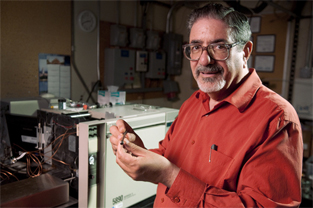The Wisconsin Initiative for Science Literacy salutes
men and women
who have excelled in scientific research and teaching and who
inspire us
to promote learning and effective communication.
Helen E. Blackwell Jane Lubchenco
Richard N. Zare: Teaching
and research in tandem has led to a groundbreaking career
“No one has ever chosen a career in chemistry
based on a great exam or homework problem. You’ve got to get students into the
lab, where they can use their minds and their hands.”
 A prolific researcher – more than 800
publications, four books and 50 patents – a gifted teacher and mentor, and an
outstanding public servant, Professor Richard N. Zare ranks among the dozen most
influential leaders in the world in chemistry and the natural sciences. He has
received the National Medal of Science, the Welch Award, the Wolf Prize in
Chemistry, and the Presidential Award for Excellence in Science, Mathematics
and Engineering Mentoring, and is currently the Marguerite Blake Wilbur
Professor in Natural Science at Stanford University and a Howard Hughes Medical
Institute Professor. He is a pioneer in the field of laser chemistry, but also
devotes much of his time to teaching and promoting science literacy. Professor
Zare has taught an introductory chemistry class every year since arriving at
Stanford in 1977 and says teaching, whether in the classroom or elsewhere, is a
“secret weapon” that enhances his own research. A prolific researcher – more than 800
publications, four books and 50 patents – a gifted teacher and mentor, and an
outstanding public servant, Professor Richard N. Zare ranks among the dozen most
influential leaders in the world in chemistry and the natural sciences. He has
received the National Medal of Science, the Welch Award, the Wolf Prize in
Chemistry, and the Presidential Award for Excellence in Science, Mathematics
and Engineering Mentoring, and is currently the Marguerite Blake Wilbur
Professor in Natural Science at Stanford University and a Howard Hughes Medical
Institute Professor. He is a pioneer in the field of laser chemistry, but also
devotes much of his time to teaching and promoting science literacy. Professor
Zare has taught an introductory chemistry class every year since arriving at
Stanford in 1977 and says teaching, whether in the classroom or elsewhere, is a
“secret weapon” that enhances his own research.
Professor Zare’s research in
laser chemistry has resulted in a greater understanding of chemical reactions
at the molecular level, contributing to solving a variety of problems in
chemical analysis. He and his students have used this approach to study many
types of matter, including analyzing organic molecules from a Mars meteorite
for signs of life. He also conducts research on items much more down to earth:
studying the bubble movement in beer as it’s poured into a glass.
According
to Professor Zare, the core of successful research is questioning the most
fundamental assumptions; teaching forces him to do just that. It has made him
realize the importance of lab work and getting students involved in research. “No
one has ever chosen a career based on a great exam or homework problem,” he
says. “You’ve got to get students into the lab, where they can use their minds
and their hands.” One of his goals is to
foster creativity in science, and he urges students to take risks in their work.
“Creativity requires passion, resources, and the daring to play with ideas and
accept the risk that what you are doing might completely fail.”
As a
Howard Hughes Medical Institute professor, he has designed a hands-on, multi-disciplinary
course to explore the relationships of organisms with light. Students study
everything from photosynthesis to eyesight, combining chemistry, physics and
biology to learn how organisms sense and use light. A second course in
biochemistry is aimed at motivating students to pursue a research career.
In
March 2010, Zare was awarded the American Chemical Society’s Priestley Medal for his lifetime achievement in and contributions to chemistry. The highest
honor that the ACS bestows, this award is a measure of the great impact he has
had on many facets of chemistry, including chemical education, science literacy
and research. His Priestley Medal
address on fostering creativity is a must read.
He has also received the 2010 BBVA Foundation of Knowledge Award in Basic Sciences. You can read his acceptance speech here.
Richard Zare is the recipient of 10 honorary degrees
and numerous awards. He is a member of the National Academy of Sciences, the
Royal Society of Great Britain, the Chinese Academy of Sciences and the Indian
Academy of Sciences, and he has served six years on the policy board of the
National Science Foundation — the last two as chair.
"In the same spirit as the Wisconsin Initiative for Science Literacy,
I believe in the importance of heightening the awareness of the
general public to the role science plays in our daily lives. To me,
what is more significant than understanding the basis of any specific
scientific fact is the appreciation of what scientists try to do to
understand better the world around us. To me, that is the real
meaning of scientific literacy."
Visit Professor Zare's website
Professor Zare discusses why writing matters
|